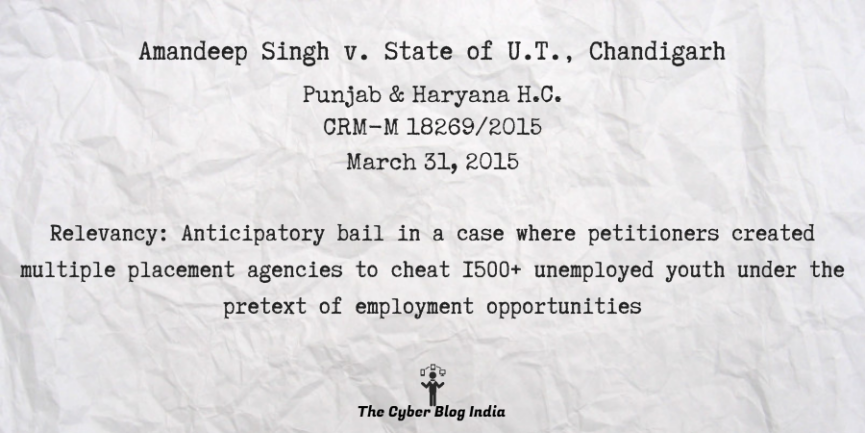Amandeep Singh v. State of U.T., Chandigarh

Amandeep Singh v. State of U.T., Chandigarh
In the High Court of Punjab & Haryana
CRM-M 18269/2015
Before Justice Hari Pal Verma
Decided on March 31, 2015
Relevancy of the case: Anticipatory bail in a case where petitioners created multiple placement agencies to cheat 1500+ unemployed youth under the pretext of employment opportunities
Statutes & Provisions Involved
- The Information Technology Act, 2000 (Section 66D)
- The Indian Penal Code, 1860 (Section 120B, 420)
- The Code of Criminal Procedure, 1973 (Section 438)
Relevant Facts of the Case
- The petitioners have a network of more than 400 companies and allegedly charged ₹ 1,500 for registration as a consultant for arranging interviews. The court had passed an order for interim bail for the petitioners on 02.07.2013.
- The petitioners were not cooperating with the investigation of the case, and this was informed to the court in 2014. They were directed to appear before the Investigating Officer on 28.10.2014 after the status report of the investigation was filed. Such complaints of non-compliance were again made to the court which was denied by their counsel.
- Several other FIRs were also lodged against these petitioners under Section 66D of the Information Technology Act, 2000 apart from the above-mentioned complaints. They opened placement agencies even after the registration of the said FIR, thereby misusing the interim bail granted to them.
- They opened new companies to mislead and cheat innocent unemployed youths. Also, the landlord of the buildings from whom the petitioners hired the space for those new companies had complained that the cheques issued by them for payment of rent had been dishonoured by their bank.
- Hence, the present petition has been filed by the accused, i.e., the petitioners, praying for a grant of anticipatory bail.
Prominent Arguments by the Advocates
- The respondent’s counsel submitted that the petitioners have committed various white-collar crimes which include cheating unemployed youth by promising them job placements and charging money for it. They also arranged fake interviews which did not fetch any job for the youths. They had taken money from 1,597 students and charged ₹ 1,700 from each of them by promising job placements.
Opinion of the Bench
- The petitioners are not entitled to receive protection under Section 438 of the Code of Criminal Procedure, 1973.
Final Decision
- The court dismissed the petition.
